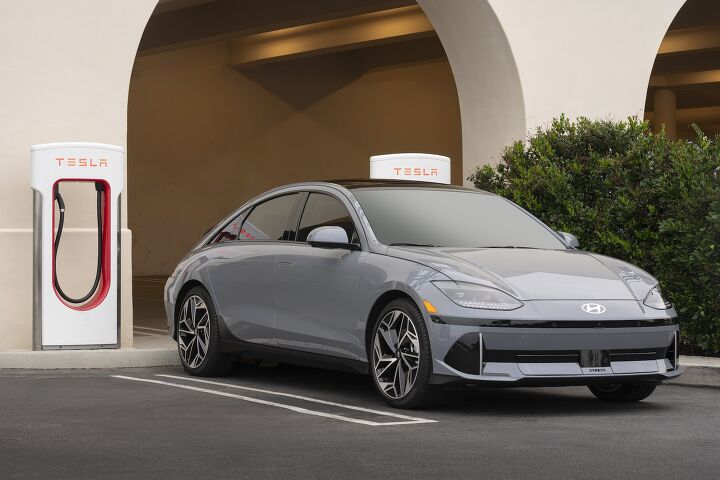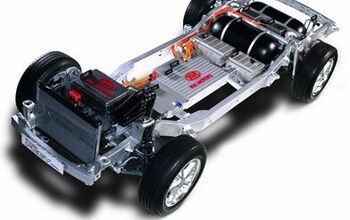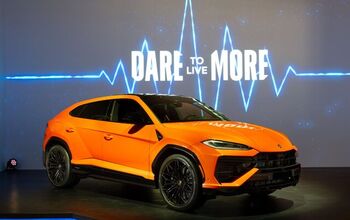Hyundai Latest to Jump on NACS Bandwagon

In what must surely be some of the least surprising automotive news you’ll read today, the corporate duo of Hyundai and Genesis have announced they will be adopting the North American Charging Standard for its EVs. This change will debut in the final quarter of next year.
As an aside, we’ll reiterate what we’ve been saying every time an automaker makes this declaration (and about all of them have, by now): This wholesale shift to NACS, which really wasn’t a “charging standard” at all in the truest sense of the word, is akin to this writer inventing a new grill on which to cook chicken in the backyard, call it a “grilling standard” and then have the likes of Weber and Traeger adopt the design. And likely pay for the privilege to do so.
It's a bit more involved than that, of course. After all, Tesla – like ‘em or lump ‘em – has built the country’s most populous and robust charging infrastructure for electric vehicles.
“Our collaboration with Tesla marks another milestone in our commitment to delivering exceptional EV experiences to our customers,” said José Muñoz, president and global COO, Hyundai Motor Company and president and CEO, Hyundai Motor North America. After typing all that out, it occurs to us that Muñoz must have one hell of a business card.
Owners of existing and future Hyundai EVs with the current CCS will have access to the Tesla Supercharging Network starting in Q1 2025. Hyundai will offer an adapter to these customers. Hyundai will also make adapters available to charge NACS-equipped vehicles at CCS chargers. This is a good thing.
Don’t forget that Hyundai is part of a multi-company group said to be developing a new, high-powered North American charging network with at least 30,000 chargers. The first American stations in this new network are targeted to open next summer. If you’re wondering, Hyundai sold nearly 35,000 of its Ioniq5 and Ioniq6 all-electrics so far this year – Kona EV numbers aren’t broken out – representing about six percent of its total YTD volume of 595,147 vehicles.
[Image: Hyundai]
Become a TTAC insider. Get the latest news, features, TTAC takes, and everything else that gets to the truth about cars first by subscribing to our newsletter.

Matthew buys, sells, fixes, & races cars. As a human index of auto & auction knowledge, he is fond of making money and offering loud opinions.
More by Matthew Guy
Latest Car Reviews
Read moreLatest Product Reviews
Read moreRecent Comments
- GregLocock They will unless you don't let them. Every car manufacturing country around the world protects their local manufacturers by a mixture of legal and quasi legal measures. The exception was Australia which used to be able to design and manufacture every component in a car (slight exaggeration) and did so for many years protected by local design rules and enormous tariffs. In a fit of ideological purity the tariffs were removed and the industry went down the plughole, as predicted. This was followed by the precision machine shops who made the tooling, and then the aircraft maintenance business went because the machine shops were closed. Also of course many of the other suppliers closed.The Chinese have the following advantagesSlave laborCheap electricityZero respect for IPLong term planning
- MaintenanceCosts Yes, and our response is making it worse.In the rest of the world, all legacy brands are soon going to be what Volvo is today: a friendly Western name on products built more cheaply in China or in companies that are competing with China from the bottom on the cost side (Vietnam, India, etc.) This is already more or less the case in the Chinese market, will soon be the case in other Asian markets, and is eventually coming to the EU market.We are going to try to resist in the US market with politicians' crack - that is, tariffs. Economists don't really disagree on tariffs anymore. Their effect is to depress overall economic activity while sharply raising consumer prices in the tariff-imposing jurisdiction.The effect will be that we will mostly drive U.S.-built cars, but they will be inferior to those built in the rest of the world and will cost 3x-4x as much. Are you ready for your BMW X5 to be three versions old and cost $200k? Because on the current path that is what's coming. It may be overpriced crap that can't be sold in any other world market, but, hey, it was built in South Carolina.The right way to resist would be to try to form our own alliances with the low-cost producers, in which we open our markets to them while requiring adherence to basic labor and environmental standards. But Uncle Joe isn't quite ready to sign that kind of trade agreement, while the orange guy just wants to tell those countries to GFY and hitch up with China if they want a friend.
- CEastwood Thy won't get recruits who want to become police officers . They'll get nuts who want to become The Green Hornet .
- 1995 SC I stand by my assessment that Toyota put a bunch of "seasoned citizens" that cared not one iota about cars, asked them what they wanted and built it. This was the result. This thing makes a Honda Crosstour or whatever it was look like a Jag E type by comparison.
- 1995 SC I feel like the people that were all in on EVs no longer are because they don't like Elon and that trump's (pun intended) any environmental concerns they had (or wanted to appear to have)


































Comments
Join the conversation
The downside to this decision is that Tesla V3 chargers only go to 400 Volts, while EGMP-platform H/K/G cars cars can be charged at 800 Volts. So filling at a Supercharger today would take twice as long as Hyundai advertises.
But apparently Tesla V4 chargers will go to 800 V, so this will be better for everyone.
https://insideevs.com/news/690142/hyundai-tesla-nacs-win/
Maybe these won’t melt